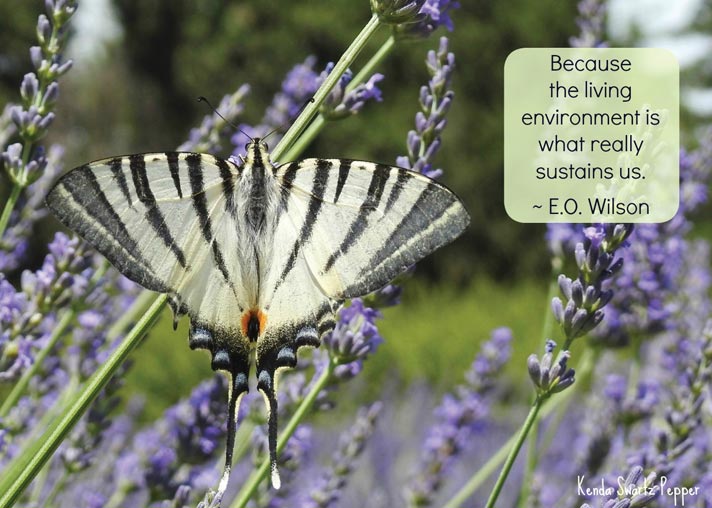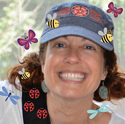Love Thy Pollineighbor – December 2017/January 2018
On Tuesday, October 17, roughly one year from beginning the process of working toward Jacksonville’s Bee City certification, the Bee City leadership team experienced another setback during our third council meeting.
After our team worked industriously to overcome council’s initial objections by generating financial independence, raising $2200, by creating self-reliance so to minimize staff time, and by garnering overwhelming support from the community, we were met with a new set of hurdles by three Councilors who were the vociferous voices of opposition: alleging bureaucratic processes, including expanding city government, and a drain on staff time. There was also a supposition that perhaps not much of our food is grown here in Jacksonville, thus, seemingly, there may not be a great need for pollinators in Jacksonville. Moreover, contradictory concerns were stated: banning Roundup and Crossbow (not within the purview of a Bee City) and planting milkweed, which could be toxic to dogs.
In addressing the latter, I’d like to highlight a milkweed misconception. Milkweed does contain toxins, which are harmful if consumed in large quantities, but it tastes horrible, making it a highly unlikely meal for any animal with another food source. In small amounts, it may cause GI distress much like poinsettias, daffodils, and many other common, toxic plants in our environment. Milkweed is the only plant a monarch caterpillar will eat. Would we wipe out the monarch population based on an unlikely premise that milkweed will harm our companion animals? Besides monarchs, many pollinators benefit from milkweed.
Conversely, both glyphosate and Crossbow are notably toxic to human and nonhuman animals. Glyphosate, the main ingredient in Roundup, is linked to malignant lymphoma in dogs as well as to breast cancer and Non-Hodgkin’s Lymphoma in humans. Credible resources, including a first-hand account, confirm glyphosate has significant persistence in the environment (years) despite the statement from one councilor who claimed it dissipates in 24 hours. Also, 2, 4-D, the main ingredient in Crossbow, was an active ingredient in Agent Orange, and is linked to a variety of cancers in humans as well as bladder cancer in dogs.
Given the prevalence of these pesticides in our environment, the likelihood is far greater that animals, particularly our dogs and cats, will get sick and potentially die from synthetic pesticides, because they walk, play, or roll alongside roadways and sidewalks and in areas like the parks, yards, and trails that have been sprayed. They bring these poisons into the home and then ingest them when they groom their fur and paws.
The arguments posed that night send a message that environmental stewardship, which is part of the city’s comprehensive plan, is not a legitimate concern of nearly half the elected officials expected to uphold that plan.
But perhaps there’s a hidden gem in these arguments? Maybe now we can open a dialogue about the overuse of Glyphosate and Crossbow in our environment given both are toxic to humans, animals, and pollinators.
I want to personally thank three Councilors, Garcia, Gregg, and Lewis along with Mayor Becker who spoke in support of protecting Jacksonville’s pollinators. Councilor Criss Garcia rose from the smoldering ashes lifting the cloud of opposition with a speech that ended in an eruption of applause from the audience:
“Government is a collective representation of its citizens, so when they (Bee City leadership team) come to us asking for credibility, in my mind, they’re the credibility, they give us credibility; we’re just reflecting it back. In all of our actions, our values should be represented…as a councilor, we have the basic work of empowering the people that come to us with a passion for our shared community. And clearly they have that, and they’re bringing it to us, and it’s our job not to hold them back with the structure of government but to find a place where they can prosper within it.
…for me, respecting and protecting the natural world is one of the most key things that we need to do, because those are the processes that sustain us. Not only as individuals but as a community, and I really believe that when we look around our town, we have the vineyards, we have the farms, and that agriculture and viticulture are part of the business of being here in Jacksonville.
…So, I just wanted to…collectively address what I feel is a very important group coming to us and asking for support for a very important cause, and we shouldn’t turn them away on the basis the pen is too heavy to lift.”
The team and I will be meeting in a few weeks to determine our next steps. I envision despite the absence of a Bee City USA certification, we’ll continue to have a presence in the community, because we’re here to help protect the pollinators, thus our local ecology, our food sovereignty, and our children’s futures.

 When she’s not working, volunteering, fiddling about the garden, photographing nature, being a pollinactivist, blogging about social and environmental justice, or pawning her eco-children’s book, Kenda, a former Monarch butterfly docent, gets her kicks hanging with her husband, her dog, and the pollineighbors.
When she’s not working, volunteering, fiddling about the garden, photographing nature, being a pollinactivist, blogging about social and environmental justice, or pawning her eco-children’s book, Kenda, a former Monarch butterfly docent, gets her kicks hanging with her husband, her dog, and the pollineighbors.
Well said Kenda, and thank you and your team for fighting the good fight for the rest of us. To this observer of the meetings, it seemed that certain members of the Council disingenuously laid out a set of obstacles during their rejection at that earlier meeting nearly a year ago, and you and your team overcame those obstacles with flying colors — proving that you could raise a large team of volunteers too do the actual work, raise money, and garner tremendous community support for your program. Councillor Cassaleggio in the most recent meeting noted something to the effect that he could only have wished for such support, especially financial, when he led the Boosters. And yet that show of support — no matter how far your team overshot the mark — was not enough to actually accomplish anything except to bring up a new set of obstacles from three of those councillors. It appears very likely from this, and from their subsequent commentary, much of it ill-thought-out, that no amount of anything done by your team was ever going to be sufficient to gain their support, and in this observer’s opinion they should have been big enough to own up to that from the very start of this process. Both meetings that I attended had one thing in common — it seemed that there was a great concern, if not a tangible fear, shared by the three objectors to city sponsorship of community involvement in the environmental stewardship of our town, that your team has as part of your agenda the confiscation of Roundup and Crossbow out of their (and the City’s) hands. This came up despite repeated statements that this is not true and is not within the bailiwick of your team. The “threat” your team poses may be more of an insidious education program about the use of these chemical defoliants that might serve to undermine the established order. I note this perverse reordering of environmental priorities because I think it should be explored in greater depth. In my world, real men pull weeds instead of pouring poison — even if it’s only suspected of being poisonous to children and animals — into the ground and the groundwater and the elementary schools — where we all play and live.